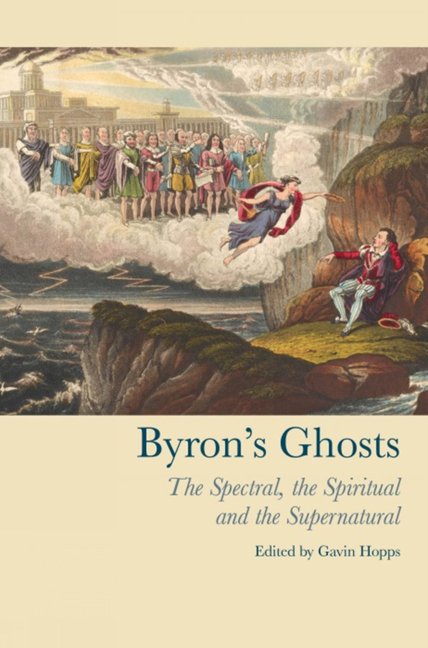Book contents
- Frontmatter
- Dedication
- Contents
- Acknowledgements
- Texts and Abbreviations
- Introduction: The Re-Enchantment of Romanticism
- Chapter 1 Determining Unknown Modes of Being: A Map of Byron's Ghosts and Spirits
- Chapter 2 Shades of Being: Byron and the Trespassing of Ontology
- Chapter 3 Byron and the Noonday Demons
- Chapter 4 Conjuration and Exorcism: Byron's Spectral Rhetoric
- Chapter 5 Byron avec Sade: Material and Spectral Violence in Childe Harold's Pilgrimage Canto IV
- Chapter 6 ‘’Twixt Life and Death’: Childe Harold's Pilgrimage, Don Juan and the Sublime
- Chapter 7 Byron, Ann Radcliffe and the Religious Implications of the Explained Supernatural in Don Juan
- Chapter 8 The Haunting of Don Juan
- Chapter 9 Being neither Here nor There: Byron and the Art of Flirtation
- Afterword: Blowing on a Dead Man's Embers: Byron's Biographical Ghosts
- Bibliography
- Notes on Contributors
- Index
Chapter 6 - ‘’Twixt Life and Death’: Childe Harold's Pilgrimage, Don Juan and the Sublime
- Frontmatter
- Dedication
- Contents
- Acknowledgements
- Texts and Abbreviations
- Introduction: The Re-Enchantment of Romanticism
- Chapter 1 Determining Unknown Modes of Being: A Map of Byron's Ghosts and Spirits
- Chapter 2 Shades of Being: Byron and the Trespassing of Ontology
- Chapter 3 Byron and the Noonday Demons
- Chapter 4 Conjuration and Exorcism: Byron's Spectral Rhetoric
- Chapter 5 Byron avec Sade: Material and Spectral Violence in Childe Harold's Pilgrimage Canto IV
- Chapter 6 ‘’Twixt Life and Death’: Childe Harold's Pilgrimage, Don Juan and the Sublime
- Chapter 7 Byron, Ann Radcliffe and the Religious Implications of the Explained Supernatural in Don Juan
- Chapter 8 The Haunting of Don Juan
- Chapter 9 Being neither Here nor There: Byron and the Art of Flirtation
- Afterword: Blowing on a Dead Man's Embers: Byron's Biographical Ghosts
- Bibliography
- Notes on Contributors
- Index
Summary
From its inception, the discourse of the sublime has placed emphasis on the failure of the mind to comprehend the grand, the vast and the terrifying. At its most radical, in the neo-lacanian revision of the Kantian sublime proposed by Slavoj Žižek, the connection between sublimity and reason is brought to an absolute, nihilistic conclusion. For Žižek, since representations are always lacking – formed, that is, on the basis of their exclusion of some contradictory, impossible object, otherwise known as the Real – the truth is no longer a noumenal, freely indeterminate beyond, but rather ‘the ultimate emptiness of all our gestures’. In this essay, I seek to explore the relation between emptiness, negation and the sublime as presented by Byron in the closing cantos of Don Juan. I want to suggest that while Byron appears to share Žižek's suspicion of the transcendental aspirations of the sublime, his particular critique is not directed against transcendentalism per se but rather against the ambitions of the sublime to take the place of religion. In essence, this essay will claim that for Byron the encounter with the sublime leads not to the triumph of Reason, nor to its nihilistic voiding, but results, rather, in the opening out of consciousness to the haunting of the divine.
As David L. Sedley has argued, the emphasis in discourses of the sublime on cognitive failure originates in the sceptical tradition. Sedley's argument, which focuses on the development of the sublime in Montaigne and Milton, relates the destructive tendencies of the concept to its origins in early modern doubt. In Montaigne's Journal de Voyage (1580–1581), for instance, a sceptical attitude to historical accuracy leads to the creation of a grand or sublime style, which stems ‘not from coherence but from fragmentation […] not from the success of cognition but from cognition's collapse’. The object of Montaigne's attention is the ruins of Imperial Rome. Whereas previous scholars invoked the Aristotelian category of admiratio to convey a passage from bewilderment to coherence, so that ancient ruins can become, after all, objects of knowledge, for Montaigne the idea that Rome cannot be known as a thing-in-itself precipitates a sense of cognitive failure, which fosters, in turn, a feeling for that which lies beyond the realms of representation.
- Type
- Chapter
- Information
- Byron's GhostsThe Spectral, the Spiritual and the Supernatural, pp. 147 - 164Publisher: Liverpool University PressPrint publication year: 2013



